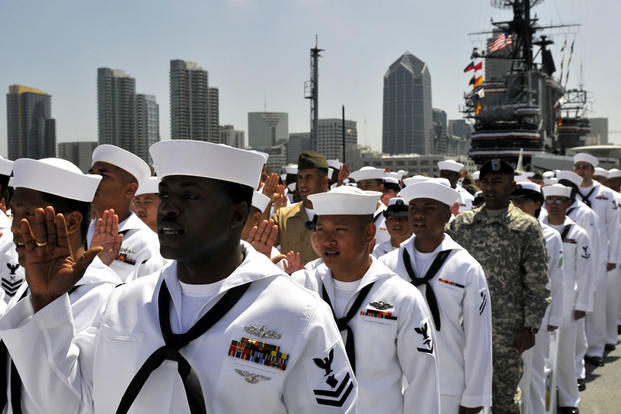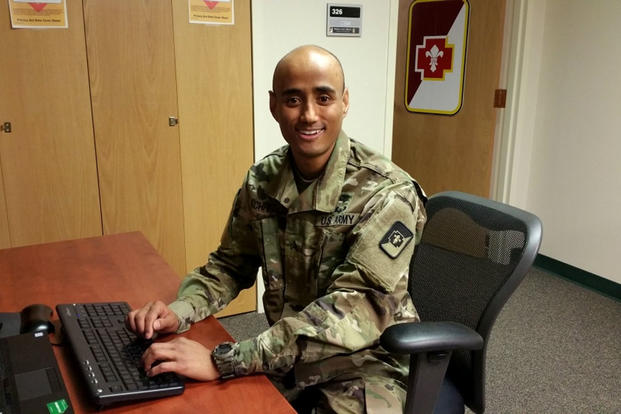Army Spc. Charles Choi, 32, originally from South Korea, has a bachelor's degree and a master's in statistics from Cornell University. He has education and skills that make him a highly valued prospect for the military, but he hasn't made it to Basic Combat Training after signing up with the Army Reserve.
He has been waiting for two years.
Yes, I'm in limbo," Choi said in an interview with Military.com. "I'm still waiting for the security clearance to be completed."
Choi is one of several non-citizen enlistees who joined the military through the Military Accessions Vital To National Interest (MAVNI) program, and spoke with Military.com about how they've been stuck waiting months or years for clearances and security screenings to process.
The program, created to attract those with highly sought skills for military service, has been essentially suspended amid political battles over immigration policy. Of the estimated 10,400 troops who have signed up to serve through MAVNI since 2008, more than 1,000 now face uncertain futures. Some can't risk the wait.
For Choi, that's especially true.
"Delays are so long and we have a finite length to our visas and that's where the real problem comes in," he said.
His visa will expire in less than a year.
"So if they just keep us in limbo and if we run out of visa status, then we cannot work or drive," he said. "It's a very screwed-up situation."
The Complex History of MAVNI
In 2012, well before MAVNI fell victim to the nation's ever-shifting immigration policies, then-Army Chief of Staff Ray Odierno invited Sgt. Saral Shrestha to his Pentagon office for a photo op and a congratulatory grip-and-greet. Shrestha, who was born in Nepal, had just won the Army's "Best Warrior" competition.
Shrestha, who earned citizenship through MAVNI, was honored later that year at the annual Association of the U.S. Army's convention as the "Soldier of the Year."
Shrestha's motto is "Mission first, soldiers always." He said that "MAVNI was a blessing" in his progress from student visa to the Army and then to taking the oath as a citizen.
Last month, Army Sgt. Santosh Kachhepati, a combat medic with the 62nd Medical Brigade was selected for the Enlisted to Medical Degree Preparatory Program, or EMDP2. He will begin his studies to become a doctor at George Mason University in Virginia in the fall.
"I consider this opportunity to be an Army physician an honor and a privilege to serve the medical needs of our soldiers who risk their lives protecting this nation," Kachhepati said, according to a release from Joint Base Lewis-McChord.
JBLM said that Kachhepati, also from Nepal, "came to the United States to attend college at the University of Texas at Arlington. He graduated U.T.'s Nursing Program with Honors in 2013."
"He enlisted in Army in 2014 through the Military Accessions Vital to National Interest program, which allows certain qualified non-citizens to enlist in the U.S. military and thereby gain eligibility for U.S. citizenship," JBLM said.
MAVNI began in 2008 as a one-year pilot program with the goal with the goal of bringing in non-citizen recruits with language or medical skills for the nation's counterinsurgency wars and giving them a fast track to citizenship in return.
Adm. Eric Olson, then-commander of U.S. Special Operations Command, said at the time that MAVNI recruits were "operationally critical" to the military's needs. But the program from the onset was caught up in political immigration debates and the high command's security concerns.
The program was suspended in 2009 over fears of insider threats in the ranks when Army Maj. Nidal Malik Hassan, a psychiatrist born in the U.S., shot and killed 13 people and wounded more than 30 others in a rampage at Fort Hood, Texas, on Nov. 5 of that year.
The restrictions were lifted again in 2012, shortly after Shrestha won the "Soldier of the Year" award. Since then, MAVNI recruits have performed higher on entrance tests and had lower attrition rates than native-born troops, according to military data. But the program reached a turning point in September 2016.
The beginning of the end for MAVNI came in the form of a September 2016 memo to the service secretaries from Peter Levine, then the acting under secretary for personnel and readiness.
Levine said that the MAVNI pilot program "is currently set to expire on Sept. 30, 2016."
As it turned out, that wasn't quite so.
In the same memo, Levine said that "changes in the enclosed guidance will strengthen and improve the execution of the MAVNI program."
He said that for MAVNI in the coming year, "the maximum number of accessions will be: Army -- 1,200; Navy -- 65; Marine Corps -- 65; and Air Force -- 70."
Despite the language suggesting the program's continuation, Pentagon spokespeople said the program was effectively allowed to end last October, when tighter screening procedures were put in place for MAVNI recruits who had already signed up.
Mattis Looks To Save MAVNI
In a memo last July to Defense Secretary Jim Mattis, Pentagon personnel and intelligence officials warned of the "espionage potential" from foreign-born recruits.
"While the Department recognizes the value of expedited U.S. citizenship achieved through military service, it is in the national interest to ensure all current and prospective service members complete security and suitability screening prior to naturalization," the memo said.
Foreign-born recruits would have to "complete a background investigation and receive a favorable military security suitability determination (MSSD) prior to entry in the active, reserve, or Guard service," the memo said. "Those in the MAVNI program and other foreign-born recruits may have a higher risk of connections to Foreign Intelligence Services."
However, Mattis, in a session with defense reporters last October, said he was looking for ways to keep MAVNI alive despite the 2016 Levine memo that had again suspended the program.
"We are taking the steps obviously to save the program, if it can be saved," Mattis said. "And I believe it can."
In January, on board his plane en route to Vietnam, Mattis held out the possibility that MAVNI could be renewed once enhanced vetting procedures were ironed out.
Mattis said that an internal examination had found that procedures were lax in screening MAVNI recruits.
"We were not keeping pace with our usual standard," he said.
"We've got to look people's backgrounds, and if you have a lot of family members in certain countries, then you come under additional scrutiny," he added. "Until we can get them screened, we can't bring in more.
"You've got to be able to screen them as they come in, rather than get them in and then you send them off to a unit and they say, 'By the way, they don't have security clearance yet.' And then they say, 'Well, thanks very much, but I can't use them.'
"So it's simply a matter of aligning the process, the recruiting process with the usual screening process," Mattis continued. "There's nothing more to it."
Don't Go Climbing Mount Kilimanjaro
The changes in the rules since 2016 have left more than 1,000 recruits already accepted into the military in a state of bureaucratic limbo with time running out on their visas while they await security clearances.
Choi, the Korean Army specialist, described filling out a form that required him to list his travel to foreign countries over the last seven years. He didn't list a trip to Tanzania to climb Mount Kilimanjaro, which had occurred more than seven years before he filled out the form.
Six months later, an Army investigator gave him a call. They had found out about the trip to Tanzania and needed some "points of clarification," Choi said. "The way they do it is just really not organized at all. It's kind of clear this was made up on the fly."
Choi said his battalion commander has urged him to look at the possibility of attending Officer Candidate School.
Army Reserve Pfc. Alan Huanyu Liang, 24, is also caught up in the same screening logjam while waiting to report to BCT. He was born in China, has been living in the U.S. for six years and has a bachelor's degree from University of California, Los Angeles.
He signed his contract under the MAVNI program in May 2016.
"Since then, my life has been drastically changed by this program," he told Military.com. "From the day I signed my contract, I have been eagerly waiting for my ship day [to BCT]."
Now, he said, it has been almost two years and no progress has been made since he signed his contract.
"I have been drilling every month since I was in-processed into my unit, and I witnessed people coming later to the unit than I did get shipped and came back with a uniform," he said. "I really, really envy them. I wish one day I can be in that uniform and serve like a real soldier. I keep asking my recruiter and all I am told is to wait."
Another MAVNI recruit, who didn't want her name used, told Military.com that she has been at a training base for two years after completing BCT while awaiting additional screening that would let her go to AIT, or Advanced Individual Training.
In the meantime, she does paperwork.
"You need the favorable adjudication [Military Service Suitability Determination] to go to AIT," she said. "I'm between a rock and a hard place. It's kind of ridiculous, but I am still motivated by the idea of serving."
Lawyer Who Built MAVNI Pushes To Save It
"There's an epic bureaucratic fight going on," said Margaret Stock, a lawyer and former Army lieutenant colonel who was instrumental in planning and initiating the MAVNI program while still in the service.
"It's an appalling example of bureaucratic incompetence," she said of the efforts to kill the MAVNI program and subject those who have already signed up to endless screening.
"They're saying the MAVNIs are some kind of security threat," Stock told Military.com, but "there is no specific threat" that justify strictures that would kill a program that has already proven its worth.
"They pose the same threat that U.S. citizens would," said Stock, the recipient of a MacArthur "Genius Grant" fellowship.
To meet a range of emerging threats, "we need these people," she said. "What we don't need is people sitting on a base for 18 months doing nothing because of background checks."
-- Richard Sisk can be reached at Richard.Sisk@Military.com.
Editor's note: This story has been updated to correct the rank of Charles Choi. He is a specialist. The story was also updated to remove incorrect information about Sgt. Santosh Kachhepati's deployments that was provided via a military press release.















